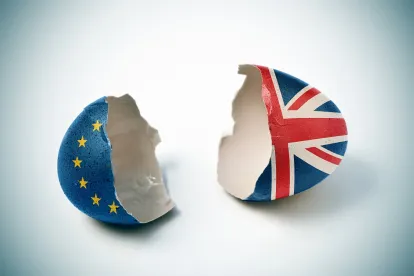Following months of, at times, protracted negotiations, the UK and European Union (EU) negotiating teams have published the text of an agreement on the terms of the UK’s withdrawal from the EU.
These negotiations have focused on three primary topics:
-
the settlement of the UK’s existing liabilities to the EU, known in Brussels as the reste à liquider or, more prosaically, the “divorce bill;”
-
the treatment of EU nationals in the UK and UK nationals in the remaining 27 EU Member States (“EU27”) following Brexit; and
-
the border between the Republic of Ireland and Northern Ireland, which forms part of the UK.
Generally speaking, the agreed terms reflect to a significant degree the negotiating position set out by the EU27.
What does it mean?
The Agreement paves the way for the European Council to determine next week that “sufficient progress” has been made on the terms of the UK’s exit, which is the necessary preliminary step in opening the negotiations on the future relationship between the UK and the EU27.
What does it not mean?
The Agreement does not mean:
-
the wider set of negotiations are over;
-
the terms of the UK’s exit are formally settled (“nothing is agreed until everything is agreed”); or
-
the form of the UK’s future relationship with the EU27 has been decided.
There is therefore still no greater clarity on the legal, regulatory or judicial relationship that will exist between the UK and the EU following the UK’s departure.
What happens next?
The European Council—which includes the heads of state and government of the EU Member States—will hold a summit in Brussels on December 14 and 15, where they are expected to confirm that, on the basis of today’s agreement, “sufficient progress” on the terms of the UK’s exit has been made.
Following the summit, the negotiations are expected to move onto two inter-related areas: (1) a “transition period” following the UK’s formal departure from the EU on March 29, 2019; and (2) the future relationship between the UK and the EU. Earlier this year, the UK requested a two-year transition period to prevent a “Brexit cliff-edge” for businesses; the EU will need to determine the conditions on which it will agree to this request. The EU will also need to establish its negotiating guidelines for the future relationship, which are expected to be endorsed at the next following European Council summit in February or March 2018.
Should this next set of negotiations only begin in earnest after March 2018, it will leave very little time for the substance of the negotiations to occur. It is generally expected that any agreement on the transition period and/or future relationship must be in place by October 2018 at the latest to provide enough time for the ratification mechanics in each of the EU Member States to be completed in time for Brexit.
Regardless of the existence of a trade and transition agreement, or the status of its ratification, the UK will formally depart the EU on March 29, 2019. The only way this deadline can be extended is with the unanimous agreement of the EU27, which is considered to be unlikely.







 />i
/>i

